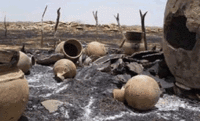African Commission against Sudanese government for large-scale forced evictions and atrocities in Darfur
In a landmark decision, the African Commission on Human and Peoples’ Rights has ruled against the Sudanese government, accusing it of committing a wide range of human rights violations against the people of Darfur. In its decision, the African Commission found Sudan responsible for large-scale forced evictions and violations of a wide range of human rights, including the rights to life, housing, food, health, judicial remedies and to be free from torture, including rape.
The ruling, released today, was made in a case brought by the Geneva-based international human rights group, the Centre on Housing Rights and Evictions (COHRE), against the Sudanese government in 2005.
The ruling came less than three weeks after the International Criminal Court (ICC) issued a second arrest warrant for Sudanese President Omar al-Bashir, on charges of genocide.
In its decision, the African Commission found Sudan responsible for large-scale forced evictions and violations of a wide range of human rights, including the rights to life, housing, food, health, judicial remedies and to be free from torture, including rape.
The Commission also issued ground-breaking decisions on the right to water and the collective right to economic, social and cultural development, as contained in the African Charter.
“This decision is a major step forward in the struggle to end human rights violations in Darfur, and will put important additional pressure on the Sudanese government,” said Salih Booker, COHRE’s Executive Director.
“With this decision, we see an African mechanism asserting its political independence and upholding international human rights standards as being fully consistent with the African charter. This differs substantially from the treatment of Sudan by many of Africa’s political leaders up until now, and highlights the importance of the African continent’s continuing development of independent pan-African bodies.”
The African Commission ordered the Sudanese government, amongst other measures, to investigate abuses in Darfur and hold those responsible accountable, to undertake legislative and judicial reforms to ensure that victims of human rights violations have effective domestic remedies, and to provide restitution and compensation to the survivors of human rights violations in Darfur.
The Commission also ordered Sudan to rehabilitate economic and social infrastructure in Darfur such as education, health care, water and agricultural services as one way to facilitate the right of Darfuris displaced by violence to return to their communities.
Bret Thiele, Senior Expert for Litigation at COHRE and lead lawyer in the case, said, “This decision is ground-breaking in that it not only reaffirms that the African Charter protects the rights to adequate food and housing, including the prohibition on forced evictions, but it also guarantees the right to water on the African continent and people’s right to economic, social and cultural development.”
Notes to editors:
- The African Charter and Commission on Human and Peoples’ Rights were established by African countries to promote and protect human rights on the African continent. The African Charter and African Commission came into effect on 21 October 1986.
- COHRE filed its case against the Sudanese government (COHRE v. Sudan) in 2005 to hold the Sudanese government accountable for the forced evictions and accompanying human rights violations that have plagued the people of the Darfur region since 2003 – violations that have left well over 300,000 people dead and another 2.5 million homeless and destitute.
- Although the African Commission delivered its verdict in the case COHRE v. Sudan in May 2009, the decision was not made public until July 2010

